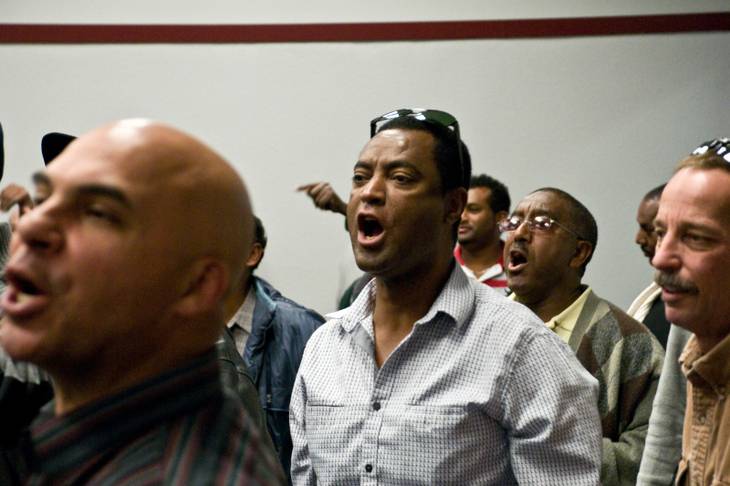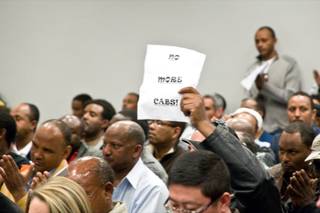VEGAS INC Coverage
It took a boisterous crowd of more than 300 people, 90 minutes of public comments and two suspensions of a public meeting for cab drivers to make their point before the Nevada Taxicab Authority on Tuesday: that allocating more cabs than necessary for large conventions and special events could hurt the industry.
The authority board unanimously denied a request for additional cabs during next month’s NCAA March Madness Basketball Tournament and significantly trimmed a request for more vehicles on the weekend leading up to the March 11 NASCAR race at the Las Vegas Motor Speedway.
Last August, the board approved six permanent cabs for every company in an annual allocation hearing, and the board concurred that those additional cabs would be enough to accommodate crowds for the March sporting events.
Drivers generally oppose any allocation requests because each driver takes home a smaller slice of revenue because it’s spread among more drivers. When taxi company owners request more cabs, they view it as an opportunity to generate more revenue. The Taxicab Authority has to decide what’s in the best interest of the public.
Cab companies had asked for four additional cabs over two 12-hour periods during the busiest days of the basketball tournament. While no NCAA games are played in Las Vegas during the tournament, thousands of people descend on the city because they can watch all the games simultaneously in the city’s sports books and can wager on the outcomes.
For the NASCAR race — the Kobalt Tools 400, part of the sport’s Sprint Cup racing series — the cab industry had asked for 10 cabs over two separate 12-hour periods on March 10 and five additional vehicles on March 9 and 11. The Sam’s Town 300 race is staged on March 10, and there are pole-qualifying runs on March 9.
The board was offered little data on the number of people expected to be in the city during the basketball tournament. The Las Vegas Convention and Visitors Authority doesn’t track visitor volume for the event. Usually, sports books are packed on the opening four days of the tournament, when a field of 64 teams is trimmed to 16 in 48 games.
The Taxicab Authority staff said the Las Vegas Motor Speedway is expecting attendance of between 95,000 to 110,000 people for the NASCAR race. The staff didn’t consider additional people in town for the Mountain West basketball tournament, which will have its championship game on March 10.
Last year, the authority board approved 20 additional cabs per company over two 12-hour periods and 18 extra on race day.
The board, which had three of five members attending, denied additional cabs March 9 and 10 and allowed three extra vehicles on the day of the big race March 11.
While the deliberation on the two requests only took about five minutes each, the discussion leading up to the decision took nearly three hours as 34 cab drivers spoke during the meeting’s public comment period. Chairwoman Ileana Drobkin had to suspend the meeting twice when attendees became too rowdy and presentations by cab company owners were disrupted by chants of, “No more cabs,” several times.
“Please give these people some respect,” Drobkin said repeatedly as drivers jeered and booed any comment in support of additional cab allocations.
The Taxicab Authority staff knew it was coming.
Normally, the board meets in a small meeting room at its Sahara Avenue headquarters to conduct business. But the staff was alerted that a large turnout of drivers was planned and the meeting was shifted to a room at Cashman Center that could accommodate 200 people.
More chairs had to be brought in and dozens stood along the sides and back of the room. Attendance was estimated at between 300 and 400.
Most of the drivers who spoke during public comment vented their frustrations about making less money when the authority board allocates additional cabs. Some said the illegal practice of long-hauling — taking a passenger on a longer route to generate a higher fare — is a byproduct of allocating more cabs because it compels some to cheat the public in order to make ends meet.
Most drivers who spoke criticized their long-hauling colleagues but admitted that the cheating occurs in part because cab company owners have high revenue expectations every shift and failure to meet financial quotas could result in disciplinary action or firing.
Drivers who spoke offered a number of suggestions, from revamping the system to allow private cab ownership as they do in New York and Chicago to having a cab driver representative on the authority board.
They said the cab industry would be at risk if drivers couldn’t make a decent wage and thousands of them had to go on welfare.
Things nearly turned ugly when the two allocation hearings opened.
Drobkin repeatedly warned the crowd to keep quiet while cab company representatives made their presentations. Twice, Drobkin shut down the meeting and the board left the room when they felt the crowd had become too unruly. Some leaders among the drivers pleaded with their cohorts to allow the owners to speak.
While most of the companies supported additional cabs, representatives of one of the largest operators — the owners of Yellow, Checker and Star cab companies — said they didn’t support additional cabs for March Madness or the NASCAR race and wouldn’t back allocation requests in the future unless it was for a major event. Western Cab Co. representatives also said they wouldn’t support additional cabs.
Bill Shranko, general manager of Yellow-Checker-Star, said he felt the permanent allocations approved in August would be enough to effectively serve the riding public in the upcoming events.
The authority board’s August action allowed each of the 16 cab companies serving Southern Nevada to add one cab to their fleets at the beginning of the following six months. The sixth permanent cab was added at the beginning of February.
But the decision to approve the six-cab allocation was appealed by the Industrial Technical Professional Employees union, which represents some local drivers. The Nevada Transportation Authority, which hears all Taxicab Authority appeals, will consider the matter Thursday.
Union organizers have asked the drivers who attended the Taxicab Authority meeting to show up at the appeal hearing.

